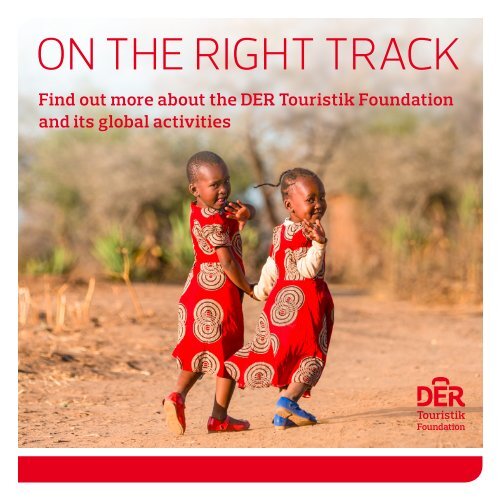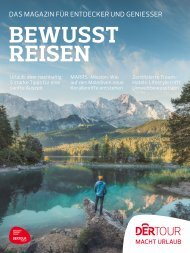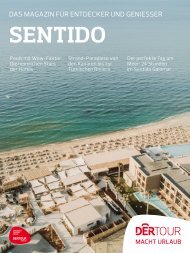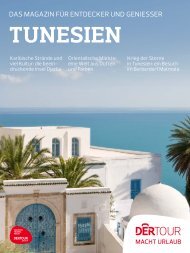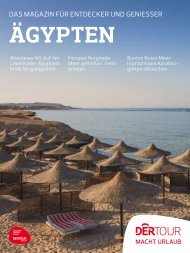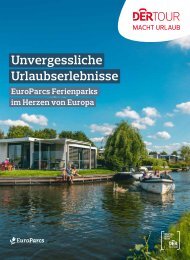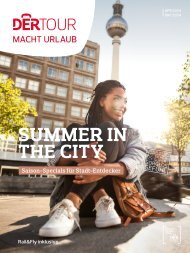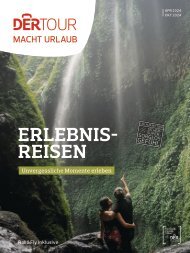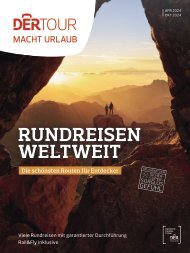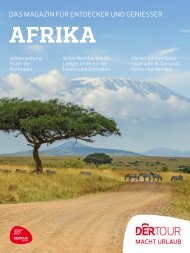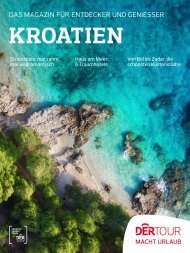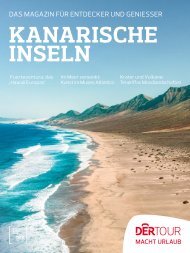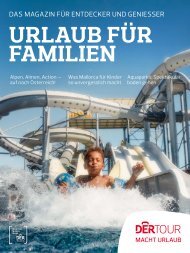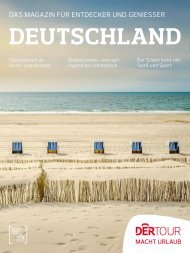DER TOURISTIK Foundation On the right track 2022
Create successful ePaper yourself
Turn your PDF publications into a flip-book with our unique Google optimized e-Paper software.
ON THE RIGHT TRACK<br />
Find out more about <strong>the</strong> <strong>DER</strong> Touristik <strong>Foundation</strong><br />
and its global activities
EDITORIAL<br />
Since 2014, <strong>the</strong> <strong>DER</strong> Touristik <strong>Foundation</strong> has been working hard in less-developed<br />
tourist destinations to ensure that children in remote areas get <strong>the</strong> chance to attend<br />
school, young people are given <strong>the</strong> opportunity to take vocational training courses<br />
and animal welfare and nature conservation get <strong>the</strong> support <strong>the</strong>y need, all while<br />
adopting a sustainable approach to its operations.<br />
This brochure is designed to demonstrate what <strong>the</strong> non-profit organisation has<br />
managed to achieve in just a few years thanks to all those involved. It will not only<br />
provide you with an overview of our global funding projects but will also allow you<br />
to learn more about <strong>the</strong> people behind <strong>the</strong> projects.<br />
We have achieved a lot, which is encouraging and is providing us with fresh<br />
momentum. This will enable us to help our project partners and support ongoing<br />
and upcoming aid projects even during <strong>the</strong> challenging pandemic at a time when<br />
travel is slowing down and donations are becoming scarce. We’re looking well into<br />
<strong>the</strong> future to ensure our planet provides us all with good quality of life.<br />
Sören Hartmann<br />
Chairman of <strong>the</strong> Management Board of <strong>the</strong> <strong>DER</strong> Touristik <strong>Foundation</strong><br />
and CEO of <strong>the</strong> <strong>DER</strong> Touristik Group<br />
2
CONTENTS<br />
Introduction4<br />
The <strong>DER</strong> Touristik <strong>Foundation</strong><br />
Hot topic: Tanzania 8<br />
Educational support and nature conservation:<br />
how a comprehensive development project in Tanzania<br />
is helping to make a difference<br />
Investing in people 16<br />
Learning for a better future: school-building and<br />
training/education projects around <strong>the</strong> world 18<br />
The Smiling Gecko aid project in Cambodia 20<br />
The incredible story of Mariya Un Noun 24<br />
Pimali Association: new prospects for disadvantaged<br />
youths in Thailand 26<br />
Nature conservation 28<br />
Nature conservation and environmental protection<br />
around <strong>the</strong> globe 30<br />
Mauritius: restoration of native habitats through<br />
<strong>the</strong> protection of tortoises 32<br />
How coral reefs in <strong>the</strong> Caribbean are showing<br />
<strong>the</strong>ir colours again 36<br />
Animal welfare 38<br />
Effective animal welfare 40<br />
Greece: a safe place for marine mammals to retire 42<br />
South Africa: how <strong>the</strong> Black Mambas ensure law and order<br />
in Kruger National Park 44<br />
About us 48<br />
Management Board. Members. Funding goals. <br />
Support54<br />
How you can support us<br />
3
FIGHTING POVERTY<br />
& CREATING NEW<br />
PROSPECTS.<br />
The <strong>DER</strong> Touristik <strong>Foundation</strong> supports social and ecological projects in tourism regions. The work<br />
that <strong>the</strong> organisation does all over <strong>the</strong> world provides young people with future prospects, empowers<br />
women and makes a considerable contribution to improving nature conservation and animal welfare.<br />
Global reach, local touch<br />
A child in Tanzania attentively and<br />
eagerly flicking through a schoolbook.<br />
A youngster in Cambodia learning <strong>the</strong><br />
ropes in a hotel kitchen first-hand.<br />
Orphans from nor<strong>the</strong>rn Thailand being<br />
given job prospects. And fences coated<br />
in chilli paste in Tanzania being used to<br />
discourage elephants from consuming<br />
farmers’ crops. Global reach, local<br />
touch: for many years, <strong>the</strong> <strong>DER</strong><br />
Touristik <strong>Foundation</strong> has been engaged<br />
in education and training for children<br />
and young people, <strong>the</strong> conservation<br />
of ecological habitats and biodiversity,<br />
and sustainable development aid.<br />
Helping people to help <strong>the</strong>mselves<br />
The <strong>DER</strong> Touristik <strong>Foundation</strong> was<br />
set up as a non-profit organisation in<br />
2014 by <strong>DER</strong> Touristik and has, since<br />
<strong>the</strong>n, gone from strength to strength.<br />
In close collaboration with o<strong>the</strong>r<br />
associations, foundations and aid<br />
organisations, we have continuously<br />
been rolling up our sleeves in order to<br />
ensure <strong>the</strong> long-term improvement<br />
of living conditions in less-developed<br />
tourism regions. Initially, we focused<br />
on school-building projects in Africa<br />
and Asia.<br />
Fur<strong>the</strong>r down <strong>the</strong> line, we also<br />
added vocational training projects<br />
as well as nature and wildlife<br />
conservation initiatives. Everything<br />
we do is designed to help people help<br />
<strong>the</strong>mselves.<br />
Projects all over <strong>the</strong> world<br />
Since it was founded, <strong>the</strong> <strong>DER</strong><br />
Touristik <strong>Foundation</strong> has funded<br />
a total of 83 projects in 26 countries<br />
across 5 continents. Numerous<br />
projects have now been successfully<br />
completed while o<strong>the</strong>rs are still<br />
ongoing and new ones are being<br />
added. The issue is that many aid<br />
projects are struggling to survive due<br />
to <strong>the</strong> difficult COVID-19 situation<br />
4
Introduction<br />
as many donors have dropped out<br />
and tourism, which is a fundamental<br />
and important source of income,<br />
has only just started to pick up<br />
again. The <strong>DER</strong> Touristik <strong>Foundation</strong><br />
has been by <strong>the</strong> side of its project<br />
partners through <strong>the</strong>se difficult times<br />
and has fully supported <strong>the</strong>m over<br />
<strong>the</strong> last two years.<br />
The dependable funding enables <strong>the</strong><br />
aid organisations to continue <strong>the</strong>ir<br />
important work. A prime example of<br />
a success story during <strong>the</strong>se difficult<br />
coronavirus times is <strong>the</strong> Smiling Gecko<br />
aid project in Cambodia (see page 20).<br />
Sustainable tourism<br />
Since 2020, clients of <strong>DER</strong> Touristik travel operators have been given<br />
<strong>the</strong> opportunity to learn more about select projects, such as Smiling<br />
Gecko (p. 20) and Pimali (p. 26) on site for <strong>the</strong>mselves and thus gain<br />
an au<strong>the</strong>ntic insight into <strong>the</strong> destination country. This ensures that<br />
travellers benefit from sustainable tourism and are made aware of<br />
pressing issues in <strong>the</strong> local areas surrounding <strong>the</strong>ir travel destinations.<br />
5
LOCAL HEROES<br />
IN TANZANIA<br />
The region of Emboreet in <strong>the</strong> Simanjiro District of Tanzania<br />
faces many challenges: human-wildlife conflict, discrimination<br />
against Maasai women, poor school infrastructure and<br />
unemployment. In order to make long-term local improvements,<br />
<strong>the</strong> <strong>DER</strong> Touristik <strong>Foundation</strong> has set up a comprehensive development<br />
project for <strong>the</strong> region toge<strong>the</strong>r with its local partners.
Side by side for increased future prospects in Tanzania:<br />
ECLAT project partner Toima Kiroya and Sören Hartmann,<br />
Chairman of <strong>the</strong> <strong>DER</strong> Touristik <strong>Foundation</strong>
Hot topic: Tanzania<br />
THE BIG PICTURE<br />
Educational support, environmental programmes and wildlife conservation:<br />
how a comprehensive development project is helping <strong>the</strong> Tanzanian region of Emboreet.<br />
Through initiatives that support<br />
education and training for children and<br />
young people and <strong>the</strong> conservation<br />
of ecological habitats and biodiversity,<br />
<strong>the</strong> <strong>DER</strong> Touristik <strong>Foundation</strong><br />
sustainably empowers <strong>the</strong> local<br />
people in <strong>the</strong> Tanzanian region of<br />
Emboreet by helping <strong>the</strong>m to help<br />
<strong>the</strong>mselves.<br />
The <strong>DER</strong> Touristik <strong>Foundation</strong>’s funding<br />
projects in <strong>the</strong> Simanjiro District<br />
(located south of Kilimanjaro and close<br />
to Tarangire and Ngorongoro National<br />
Parks) are implemented in cooperation<br />
with <strong>the</strong> partner organisations<br />
Upendo, PAMS and ECLAT.<br />
ECLAT project partners Philomena<br />
and Toima Kiroya are instrumental<br />
to <strong>the</strong> success. They are Maasai<br />
<strong>the</strong>mselves and through education<br />
have managed to escape <strong>the</strong> cycle<br />
of poverty and despair. The married<br />
couple understand <strong>the</strong> needs and<br />
challenges of <strong>the</strong>ir community and are<br />
respected and listened to by <strong>the</strong> local<br />
people and can <strong>the</strong>refore specifically<br />
target <strong>the</strong> issues and make a longterm<br />
impact with <strong>the</strong>ir projects. <br />
9
½ X<br />
ADVANCEMENT OF MAASAI WOMEN<br />
Women’s group activities: how to make maize flour (L) and soap (R)<br />
Our Maasai Women’s Education Centre is helping to improve education for women and girls<br />
Maasai women traditionally have very<br />
few <strong>right</strong>s, are usually married off while<br />
still in <strong>the</strong>ir teens and must <strong>the</strong>n look<br />
after <strong>the</strong>mselves and <strong>the</strong>ir children –<br />
often alone as <strong>the</strong> men usually have<br />
several wives. It is not uncommon<br />
for women to have to raise up to<br />
10 children though <strong>the</strong>y traditionally<br />
are not allowed to have any money.<br />
Women are also socially isolated and<br />
even have little contact with each<br />
o<strong>the</strong>r. The women’s groups address<br />
all of <strong>the</strong>se points. Since <strong>the</strong> Women’s<br />
Education Centre, which we fund, was<br />
opened in October 2017, Maasai women<br />
from <strong>the</strong> surrounding villages meet to<br />
discuss <strong>the</strong>ir experiences. Philomena<br />
Kiroya, <strong>the</strong> Founder of <strong>the</strong> Centre,<br />
has achieved huge success thanks to<br />
her tenacity and patience. As such,<br />
<strong>the</strong> women discuss economic activity<br />
and dealings with microloans which<br />
<strong>the</strong>y can use to establish a small-scale<br />
trade. Building up <strong>the</strong> women’s selfconfidence,<br />
in particular with regard to<br />
<strong>the</strong> men, requires a sensitive approach<br />
and perseverance, and also involves<br />
broaching subjects such as <strong>the</strong>ir family<br />
situation, parenting, hygiene, domestic<br />
violence and in particular birth control.<br />
The groups meet regularly for one<br />
week in <strong>the</strong> seminar centre in order to<br />
hold discussions <strong>the</strong>re toge<strong>the</strong>r with<br />
two teachers. A positive side effect is<br />
that <strong>the</strong> women see how important<br />
education is, recognise how valuable it<br />
also is for <strong>the</strong>ir children and send <strong>the</strong>m<br />
to school. So far, 58 of <strong>the</strong> 75 women’s<br />
groups formed under <strong>the</strong> guidance<br />
of ECLAT have received financial aid<br />
in <strong>the</strong> form of microloans for <strong>the</strong>m to<br />
use as start-up capital. As a result,<br />
<strong>the</strong> groups can earn an income and <strong>the</strong><br />
women obtain a sense of freedom and<br />
independence and enable <strong>the</strong>ir children<br />
to get an education.<br />
10
Hot topic: Tanzania<br />
Mamaai Letoo<br />
“I LOOK FORWARD TO EVERY MEETING”<br />
The women’s groups in Tanzania help women gain more independence. Mamaai Letoo regularly<br />
attends <strong>the</strong> meetings. She explained to us what she gets out of <strong>the</strong>m …<br />
“My life has really changed for <strong>the</strong><br />
better since I started meeting up with<br />
o<strong>the</strong>r women on a regular basis. Before,<br />
as Maasai women, we lived ra<strong>the</strong>r<br />
isolated lives. Now, we help each o<strong>the</strong>r.<br />
The training we receive at <strong>the</strong> Women’s<br />
Education Centre and <strong>the</strong> sense of<br />
belonging to <strong>the</strong> women’s group are<br />
what I treasure most. They b<strong>right</strong>en<br />
up my life! I always really look forward<br />
to <strong>the</strong> meetings, which is evident<br />
from <strong>the</strong> fact that I lay out my clo<strong>the</strong>s<br />
ready hours in advance … I learn so<br />
many useful things! And this is really<br />
important for me as I never went to<br />
school. Now I understand, for example,<br />
<strong>the</strong> importance of hygiene. It wasn’t<br />
necessarily obvious to me beforehand<br />
how important it is for me to keep my<br />
home clean, eat from clean dishes<br />
and wear clean clo<strong>the</strong>s. No one had<br />
ever taught me. The independence<br />
from my husband also helps with my<br />
self-confidence. I go shopping on my<br />
own and I now know how to ensure<br />
that my family eats healthily. What can<br />
I say? I even look a lot better and<br />
younger as my clo<strong>the</strong>s are cleaner<br />
and, most importantly, my diet is<br />
healthier! However, <strong>the</strong> best thing of<br />
all is that I have learned how to make<br />
soap and maize flour and hence how<br />
to earn my own money. I’m investing<br />
it in my children and <strong>the</strong>ir school<br />
education as education is <strong>the</strong> most<br />
important thing for ensuring a positive<br />
and secure future. I’m really proud<br />
of my independence. The women’s<br />
group has fundamentally changed my<br />
life. If someone were to ask me what<br />
else I need, I’d say: in <strong>the</strong> future we’ll<br />
need electricity for <strong>the</strong> maize flour<br />
mill in order to be able to operate <strong>the</strong><br />
machine more easily and by ourselves –<br />
without <strong>the</strong> men.” <br />
11
12<br />
Shouldering <strong>the</strong> workload: not only young men but also young women are trained at <strong>the</strong> Vocational Training Centre.
Hot topic: Tanzania<br />
The training is coming toge<strong>the</strong>r.<br />
TRADESPEOPLE WANTED:<br />
BRICKLAYERS, CARPENTERS AND METALWORKERS!<br />
The Vocational Training Centre ensures trainees are professionally qualified and fit for <strong>the</strong> job<br />
There are hardly any qualified professional<br />
carpenters or metalworkers in <strong>the</strong><br />
Simanjiro District, which means that<br />
expensive tradespeople need to be<br />
brought in from <strong>the</strong> neighbouring<br />
region of Arusha for construction<br />
projects. At <strong>the</strong> same time, many school<br />
leavers in <strong>the</strong> region are unable to find<br />
work because <strong>the</strong>y don’t have any<br />
professional vocational training.<br />
As a result, people migrate to <strong>the</strong> cities,<br />
unemployment is rife and <strong>the</strong>re is a lack<br />
of regional development.<br />
The Vocational Training Centre for<br />
carpenters and metalworkers is<br />
designed for secondary school leavers.<br />
It aims to provide 20 young people<br />
a year in each discipline with future<br />
prospects in <strong>the</strong> region. The two-tothree-year<br />
training course provides<br />
<strong>the</strong>m with skills in <strong>the</strong> chosen trade<br />
and involves a dual approach, whereby<br />
<strong>the</strong> training is put into practice on<br />
site as part of construction projects.<br />
Final exams are held every year –<br />
and anyone who doesn’t qualify for <strong>the</strong><br />
third year after two years of training<br />
can conclude <strong>the</strong>ir training at that point<br />
with a lower qualification.<br />
The Vocational Training Centre was<br />
officially inaugurated on 26 November<br />
2021 and assigned over to <strong>the</strong> Tanzanian<br />
Vocational Education and Training<br />
Authority (VETA). The centre consists<br />
of classrooms, bedrooms, a kitchen,<br />
a dining hall, bathrooms and a fully<br />
equipped workshop and boasts a water<br />
and electricity supply, and <strong>the</strong> teaching<br />
staff have been trained in woodwork<br />
and metalwork. In October 2021,<br />
<strong>the</strong> trainees were assigned to relevant<br />
companies for eight weeks as part of<br />
<strong>the</strong> dual training approach. Aid is also<br />
available for individuals wishing to train<br />
as bricklayers. <br />
13
IN HARMONY<br />
WITH NATURE<br />
HELPING BOTH HUMANS<br />
AND ELEPHANTS<br />
Environmental education: Living in Harmony with Nature<br />
Human-wildlife conflict is becoming an issue on account<br />
of <strong>the</strong> growing population in <strong>the</strong> region and in <strong>the</strong> areas<br />
bordering Ngorongoro and Tarangire National Parks.<br />
The Living in Harmony with Nature project is designed<br />
to educate secondary school pupils aged 14 to 20 in<br />
<strong>the</strong> Simanjiro District on <strong>the</strong> importance of a sensible<br />
and sustainable approach to animal welfare and wildlife<br />
conservation. Since 2017, more than 500 secondary<br />
school pupils at three schools have been educated using<br />
descriptive and illustrative reading material and environment<br />
days have also been organised in <strong>the</strong> neighbouring Tarangire<br />
National Park. And we won’t take our eye off <strong>the</strong> ball as <strong>the</strong><br />
local population will only grasp <strong>the</strong> importance of wildlife<br />
conservation if <strong>the</strong>y are provided with proper insight and<br />
<strong>the</strong>ir own livelihood is safeguarded.<br />
For a peaceful coexistence<br />
Protecting sensitive areas of nature and reconciling <strong>the</strong><br />
needs of humans and animals are at <strong>the</strong> heart of what <strong>the</strong><br />
<strong>DER</strong> Touristik <strong>Foundation</strong> does. A prime example of what<br />
this looks like in practice can be found in <strong>the</strong> Ngorongoro<br />
Conservation Area in <strong>the</strong> north of Tanzania. This region which<br />
borders <strong>the</strong> Serengeti is home to <strong>the</strong> semi-nomadic Maasai<br />
pastoralists who practice agriculture and keep livestock.<br />
As <strong>the</strong> areas where <strong>the</strong> Maasai live overlap with <strong>the</strong> territories<br />
of wild animals, <strong>the</strong>re are constant conflicts – which <strong>the</strong><br />
<strong>DER</strong> Touristik <strong>Foundation</strong> helps to defuse through simple<br />
measures. A prime example is <strong>the</strong> use of fences coated in<br />
chilli paste for defining elephant corridors as <strong>the</strong>se have been<br />
hugely successful. Impressively, <strong>the</strong> chilli fences keep <strong>the</strong><br />
pachyderms at bay as <strong>the</strong>ir highly developed olfactory organ<br />
is extremely sensitive.<br />
14
Hot topic: Tanzania<br />
Philomena Kiroya, Sören Hartmann, Ulrike Braun, Kathrin Sommer and Toima Kiroya in front of <strong>the</strong> Women’s Education Centre (L to R)<br />
STRONGER TOGETHER:<br />
OUR COOPERATION PARTNERS IN TANZANIA<br />
PAMS <strong>Foundation</strong><br />
The PAMS <strong>Foundation</strong>, founded in 2006, consists of a team<br />
of 200 rangers who strive to protect wildlife in Tanzania.<br />
The foundation’s aim is to protect wildlife and nature in a way<br />
that also ensures that <strong>the</strong> local population benefits.<br />
ECLAT Development <strong>Foundation</strong><br />
ECLAT is a non-profit NGO that was set up in 2008 in<br />
order to improve <strong>the</strong> lives of poor communities in Tanzania.<br />
ECLAT focuses mainly on <strong>the</strong> Simanjiro District in <strong>the</strong><br />
Manyara region of north-east Tanzania but recently cast<br />
its net wider to include o<strong>the</strong>r areas of <strong>the</strong> country in order<br />
to reach people in need. Its work includes <strong>the</strong> economic<br />
empowerment of women, <strong>the</strong> construction of educational<br />
institutions and <strong>the</strong> supply of clean water.<br />
Upendo - registered charity for <strong>the</strong> support<br />
of development projects in Africa<br />
Upendo promotes development cooperation at local<br />
community level in Africa, in particular in Tanzania.<br />
The project work is planned and carried out in close<br />
cooperation and consultation with <strong>the</strong> government<br />
which is ultimately responsible for <strong>the</strong> country<br />
and its people.<br />
15
School is fun when you learn with friends
INVESTING<br />
IN PEOPLE<br />
Obtaining a school education is still a privilege in many<br />
countries. As such, every investment in education<br />
lays <strong>the</strong> foundations for <strong>the</strong> fur<strong>the</strong>r development of<br />
any society. <strong>DER</strong> Touristik funds <strong>the</strong> construction of schools<br />
and <strong>the</strong> creation of education and training programmes<br />
in poorer countries and <strong>the</strong>refore provides disadvantaged<br />
children and young people with new future prospects.
LEARNING FOR<br />
A BETTER FUTURE<br />
Education lays <strong>the</strong> foundations for <strong>the</strong> development of any country and its people.<br />
Yet education is still a privilege in many countries. According to UNESCO, 750 million people over<br />
<strong>the</strong> age of 15 all around <strong>the</strong> world are unable to read or write. Approximately 250 million children<br />
do not even learn basic reading skills.<br />
Donations for new schools<br />
Right from <strong>the</strong> outset, <strong>the</strong> <strong>DER</strong><br />
Touristik <strong>Foundation</strong> has been focused<br />
on setting up education programmes.<br />
As such, it has funded projects all<br />
over <strong>the</strong> world that specifically<br />
benefit disadvantaged children and<br />
young people. The <strong>DER</strong> Touristik<br />
<strong>Foundation</strong>’s support ensures that<br />
<strong>the</strong>y have access to education and<br />
can obtain a secure livelihood.<br />
This boy’s education will ensure he measures up against <strong>the</strong> competition on <strong>the</strong> job market.<br />
Education equals a future<br />
The organisation has used donations<br />
to renovate schools and build brandnew<br />
ones and has not only paid for<br />
<strong>the</strong> cement and <strong>the</strong> bricks but also<br />
<strong>the</strong> teaching involved. So far, <strong>the</strong> <strong>DER</strong><br />
Touristik <strong>Foundation</strong> has funded<br />
<strong>the</strong> construction of 66 schools in<br />
21 countries across 5 continents.<br />
As a result, over 15,000 children have<br />
18
Investing in people<br />
The foundations of education: secondary school in Emboreet<br />
been allowed to attend school and<br />
have <strong>the</strong>refore been given greater<br />
opportunities to live independent lives.<br />
School-building projects are currently<br />
being funded in South Africa (Fobeni),<br />
Kenya (Lunga Lunga), Madagascar<br />
(Anjeva) and India (Settur).<br />
Practical vocational training<br />
Since 2016, <strong>the</strong> social engagement<br />
portfolio has been expanded to<br />
include o<strong>the</strong>r education and training<br />
projects. The aim is to break <strong>the</strong><br />
cycle of poverty faced by vulnerable<br />
and disadvantaged young people<br />
and women and empower <strong>the</strong>m to<br />
create a better future for <strong>the</strong>mselves<br />
and <strong>the</strong>ir communities. A prime<br />
example of a successful education<br />
project is Smiling Gecko in Cambodia,<br />
which provides young Cambodians<br />
not only with a school education but<br />
also practical vocational training in <strong>the</strong><br />
tourism industry. Flagship projects in<br />
Tanzania include a Maasai Women’s<br />
Education Centre and a Vocational<br />
Training Centre which aims to improve<br />
<strong>the</strong> job opportunities of school leavers<br />
who don’t qualify to go to university.<br />
Our cooperation partner: Reiner Meutsch <strong>Foundation</strong> FLY & HELP<br />
The main objective of <strong>the</strong> foundation, which was set up in 2009, is to fund<br />
education and training. The foundation predominantly builds new schools<br />
in developing countries with <strong>the</strong> help of its donors. The new buildings<br />
mean that many thousands of children in Africa, Asia and Latin America<br />
can attend school and are given <strong>the</strong> opportunity to lay <strong>the</strong> foundations<br />
for determining <strong>the</strong>ir own future. So far, 550 projects have been initiated,<br />
funded and overseen all around <strong>the</strong> world.<br />
19
TAKING CONTROL<br />
Smiling Gecko helps socially disadvantaged<br />
Cambodians smile again
Investing in people<br />
Hannes Schmid used to photograph famous pop singers and rock stars. He was born in Switzerland<br />
but found his second home in South Africa where he became a celebrity photographer – and probably<br />
would have continued working for glossy magazines had he not seen <strong>the</strong> dumps in Cambodia and<br />
people living in amongst <strong>the</strong> rubbish. He decided to leave <strong>the</strong> world of glitz and glamour behind<br />
and set up an aid project not far from Phnom Penh: Smiling Gecko.<br />
The opportunity to earn a living<br />
With <strong>the</strong> help of his aid organisation<br />
Smiling Gecko, Schmid developed<br />
a plot of land spanning 140 hectares,<br />
60 kilometres north-west of <strong>the</strong><br />
capital Phnom Penh, where socially<br />
disadvantaged Cambodians can attend<br />
school and learn a trade. The really<br />
special thing about it all is <strong>the</strong> holistic<br />
approach. As such, all <strong>the</strong> elements<br />
of <strong>the</strong> development aid project are<br />
interconnected, mutually support<br />
each o<strong>the</strong>r and are underpinned by<br />
training and education. As a result,<br />
Smiling Gecko helps to improve <strong>the</strong><br />
quality of life of <strong>the</strong> rural population<br />
and safeguard <strong>the</strong>ir livelihood and food<br />
security. The cluster project focuses<br />
on agriculture and livestock farming,<br />
production and trade, hospitality<br />
and tourism as well as training and<br />
education.<br />
Independent lives<br />
The <strong>DER</strong> Touristik <strong>Foundation</strong><br />
has been supporting <strong>the</strong> Smiling<br />
Gecko Farmhouse Resort & Spa<br />
since 2019. The funding has so far<br />
enabled 10 individuals to be trained<br />
as professionals. Young locals from<br />
poor families are trained at <strong>the</strong><br />
Farmhouse Resort & Spa in both<br />
<strong>the</strong> <strong>the</strong>oretical and practical sides of<br />
service, cooking, housekeeping and<br />
tourism. This is designed to enable<br />
<strong>the</strong>m to earn a sustainable living for<br />
<strong>the</strong>mselves and <strong>the</strong>ir families and lead<br />
independent lives.<br />
Our cooperation partner: Smiling Gecko<br />
In order to help destitute children and families in Cambodia, Smiling Gecko<br />
adopts a holistic approach which enables and encourages people in rural<br />
areas to lead independent lives.<br />
21
“I HAD TO DO SOMETHING!”<br />
An interview with Hannes Schmid, Founder of Smiling Gecko<br />
Hannes, how did you first get<br />
involved?<br />
The trigger for me was an upsetting<br />
encounter. I met a girl in Cambodia<br />
whose fa<strong>the</strong>r had maimed her with<br />
a blowtorch. I mean, I had already seen<br />
a lot of misery, poverty, hunger and<br />
despair but that was really too much<br />
for me. I felt that I had to do something.<br />
However, if you want to know what<br />
it’s really like for farmers living in<br />
extreme poverty or for people living<br />
on a rubbish dump, you can’t just take<br />
a quick peek at <strong>the</strong>ir lives. You have to<br />
experience it for yourself. And that’s<br />
what I did.<br />
Hannes Schmid, Founder of Smiling Gecko<br />
You ended up establishing <strong>the</strong> Smiling<br />
Gecko project. How do you train people<br />
who have never been to school?<br />
With a lot of patience and, most of all,<br />
respect. There’s nothing <strong>the</strong>y can do<br />
about it. When our newcomers first<br />
arrive, <strong>the</strong>y’re like inquisitive children,<br />
even if <strong>the</strong>y’re over 30 years old.<br />
They’re learning! Then <strong>the</strong>y go through<br />
a phase where <strong>the</strong>y have learned<br />
a few things already and <strong>the</strong>y grow in<br />
self-confidence and develop a sense<br />
of pride. By <strong>the</strong> end, <strong>the</strong>y’re individuals,<br />
real characters who know what <strong>the</strong>y<br />
want. We have to accompany <strong>the</strong>m<br />
along this journey.<br />
Can you give us an example of one<br />
such journey?<br />
Yes. The story behind our chef, Mariya<br />
Un Noun, sounds like a fairytale:<br />
she managed to make it from <strong>the</strong><br />
22
Investing in people<br />
The Smiling Gecko premises span 140 hectares – enough space for <strong>the</strong> aid organisation’s many different activities. Anyone who has received support here is on <strong>the</strong>ir<br />
way up – just like <strong>the</strong> team on <strong>the</strong> stairs.<br />
slums in Cambodia to Michelin-starred<br />
kitchens in Switzerland.<br />
Have you had any setbacks?<br />
Oh, yes, lots! Pigs, chickens and fish have<br />
died, vegetables have failed to grow<br />
and people have failed to understand<br />
me and vice versa – of course, <strong>the</strong>re<br />
were all sorts of setbacks. I’ve seen<br />
a lot of money go down <strong>the</strong> drain!<br />
But I knew that mistakes would be<br />
made and that it would be a learning<br />
experience for all of us.<br />
Money is always an issue, no?<br />
Yes, especially in terms of <strong>the</strong> project’s<br />
future. I’m replaceable but I need to<br />
find ways for Smiling Gecko to become<br />
independent in <strong>the</strong> future, starting<br />
with <strong>the</strong> funding side of things. It can<br />
only be independent if it is profitable.<br />
At <strong>the</strong> moment, it’s me who collects all<br />
<strong>the</strong> money. But we want to continue<br />
to grow! I would like to build a rice mill,<br />
for example, which farmers could take<br />
over as part of a cooperative. I would<br />
<strong>the</strong>n be able to help thousands of<br />
people get out of poverty.<br />
How can people live well<br />
independently of <strong>the</strong> aid projects?<br />
We’re just external supporters. We of<br />
course have to involve <strong>the</strong> local people<br />
in <strong>the</strong> projects and slowly but surely take<br />
a step back and be replaced. And I mean<br />
all of us – me, <strong>the</strong> coaches, <strong>the</strong> master<br />
baker and <strong>the</strong> master butcher, etc. <strong>On</strong>ly<br />
<strong>the</strong>n will we have achieved our goal.<br />
How have Smiling Gecko and<br />
<strong>the</strong> Farmhouse fared during<br />
<strong>the</strong> pandemic?<br />
The Farmhouse had to partially close<br />
in spring 2020 and 2021 due to <strong>the</strong><br />
coronavirus. During <strong>the</strong> lockdown,<br />
<strong>the</strong> trainees kept <strong>the</strong>ir jobs and were<br />
even able to acquire and develop<br />
several new skills during this time.<br />
As such, two service trainees were<br />
promoted to team leaders, a kitchen<br />
trainee rose up <strong>the</strong> ranks to become<br />
chef de partie and ano<strong>the</strong>r kitchen<br />
trainee went from chef de partie to<br />
junior sous chef. The Farmhouse is<br />
currently receiving plenty of bookings<br />
from Cambodian tourists and is being<br />
increasingly used to host conferences,<br />
which is partly making up for <strong>the</strong> lack<br />
of international guests. The Farmhouse<br />
also offers high-quality catering for<br />
events which is raising its profile and<br />
providing a new source of income.<br />
23
24<br />
A keen nose for flavour: Mariya Un Noun checking a Cambodian delicacy for seasoning.
Investing in people<br />
“COOKING IS MY LIFE”<br />
From <strong>the</strong> slums to Michelin-starred kitchens: <strong>the</strong> incredible story of Mariya Un Noun<br />
Mariya’s life started off like that of<br />
many poor girls in Cambodia. When<br />
she turned 12 years old, her mo<strong>the</strong>r<br />
sold her as a maid to a rich family.<br />
Her mo<strong>the</strong>r needed <strong>the</strong> money and<br />
signed to say that Mariya wouldn’t<br />
have any <strong>right</strong>s and would work for<br />
<strong>the</strong> family for her entire life. When<br />
<strong>the</strong> man of <strong>the</strong> house tried to rape<br />
her she narrowly escaped and fled.<br />
However, in order to be able to pay off<br />
her mo<strong>the</strong>r’s debt, she worked hard<br />
at a clothing factory. She was <strong>the</strong>n<br />
entered into forced marriage.<br />
Luckily, Mariya and her two small<br />
children were picked up by Smiling<br />
Gecko where fortune finally smiled<br />
upon her – primarily when she<br />
discovered her passion for cooking<br />
and realised she was extremely<br />
talented at it. “Cooking is my life”,<br />
says Mariya Un Noun.<br />
<strong>On</strong>e day, <strong>the</strong> CEO of <strong>the</strong> hotel<br />
management school in Lucerne<br />
stopped by – and was blown away<br />
by Mariya’s dishes. Without fur<strong>the</strong>r<br />
ado, he took <strong>the</strong> young Cambodian<br />
to Switzerland with him so that she<br />
could study at <strong>the</strong> hotel management<br />
school in Lucerne. What’s more,<br />
Mariya also passed on her knowledge<br />
of little-known Khmer cuisine to<br />
renowned Michelin-starred chefs.<br />
She got to cook with <strong>the</strong> likes of<br />
Andreas Caminada at Schloss<br />
Schauenstein, Franck Giovannini in<br />
Crissier and Tino Staub at Widder<br />
located on <strong>the</strong> Rennweg in Zurich.<br />
Mariya Un Noun is now <strong>the</strong> head chef<br />
at <strong>the</strong> Smiling Gecko Farmhouse where<br />
guests can experience how she allows<br />
<strong>the</strong> local cuisine to shine in her own<br />
unique and creative way and intuitively<br />
develops her special dishes with her<br />
own unique flair for high-quality local<br />
ingredients. Her signature dish is<br />
a mouth-watering example: fish amok<br />
with Cambodian Kampot pepper.<br />
25
LEARNING BY DOING<br />
New prospects: <strong>the</strong> Pimali Association enables disadvantaged<br />
young people in Thailand to train to work in <strong>the</strong> hotel industry<br />
26 Footnotes
Investing in people<br />
Vacancies: guests receive a warm welcome and excellent hospitality at <strong>the</strong> Pimali Guest House.<br />
In pursuit of happiness<br />
The north-eastern Thai province<br />
of Nong Khai located on <strong>the</strong> border<br />
with Laos is one of <strong>the</strong> poorest areas<br />
in <strong>the</strong> country. There are very few<br />
vocational schools <strong>the</strong>re, especially for<br />
girls. Poorly educated, disadvantaged<br />
young people and orphans leave<br />
this economically underdeveloped<br />
area once <strong>the</strong>y have finished <strong>the</strong>ir<br />
compulsory school education and<br />
move to Bangkok or o<strong>the</strong>r tourist<br />
destinations. They go in search of<br />
happiness but can usually only keep<br />
<strong>the</strong>ir heads above water by resorting<br />
to illegal jobs or prostitution. It is<br />
not uncommon for <strong>the</strong>m to become<br />
addicted to drugs.<br />
Professional training<br />
Stéphanie des Arts-Loup and<br />
Alexandre des Arts wanted to do<br />
something and founded <strong>the</strong> Pimali<br />
Centre in 2013. It provides young<br />
Thai people from disadvantaged<br />
backgrounds and orphans from<br />
Nong Khai with a professional training<br />
programme. Designed as a practical<br />
hospitality training centre, every year<br />
Pimali accepts young people who are<br />
aged 15 and over and have completed<br />
<strong>the</strong>ir compulsory school education.<br />
The concept is taking off<br />
The training, which is based on <strong>the</strong><br />
“Learning by Doing” approach, enables<br />
trainees to acquire skills required<br />
in <strong>the</strong> hotel industry and put <strong>the</strong>m<br />
into practice during a six-month<br />
internship. And <strong>the</strong> concept is taking<br />
off: as tourism in Thailand is an evergrowing<br />
sector of <strong>the</strong> economy and<br />
trained professionals with English<br />
language skills are in demand, 82% of<br />
trainees manage to get a job following<br />
<strong>the</strong>ir six-month internship.<br />
Our cooperation partner: Pimali Association<br />
Pimali strives to fight <strong>the</strong> exploitation of disadvantaged youths and<br />
reduce poverty in <strong>the</strong> north-east of Thailand. Pimali provides young<br />
people and orphans with practical training in hospitality. The aim is to<br />
provide <strong>the</strong>m with future job prospects in <strong>the</strong><br />
hospitality and tourism sectors.<br />
27
NATURE<br />
CONSERVATION<br />
The <strong>DER</strong> Touristik <strong>Foundation</strong> supports environmental projects<br />
all around <strong>the</strong> world. Current examples include projects in <strong>the</strong><br />
Caribbean and in <strong>the</strong> Indian Ocean. Off <strong>the</strong> coast of Barbados,<br />
for example, <strong>the</strong> organisation is funding a project which is designed<br />
to protect <strong>the</strong> coral reefs and includes accompanying education<br />
programmes. In Mauritius, it is striving to help restore natural habitats.
OUR WORLD<br />
IS AT STAKE<br />
The <strong>DER</strong> Touristik <strong>Foundation</strong> supports various different environmental projects<br />
Key challenge<br />
Climate protection and <strong>the</strong><br />
conservation of natural resources<br />
constitute a key challenge for society.<br />
Through its current funding projects,<br />
<strong>the</strong> <strong>DER</strong> Touristik <strong>Foundation</strong> is<br />
making a positive contribution to <strong>the</strong><br />
conservation of natural resources and<br />
hence global environmental protection<br />
and climate action.<br />
Coral reef protection<br />
The organisation is supporting<br />
measures designed to protect <strong>the</strong><br />
coral reefs that have been suffering<br />
all around <strong>the</strong> world for years due to<br />
changing environmental conditions:<br />
<strong>the</strong> rise in water temperature, ocean<br />
acidification, hurricanes, overfishing,<br />
pesticides and o<strong>the</strong>r toxic substances<br />
are adversely affecting <strong>the</strong> calcareous<br />
skeletal frames that have taken<br />
years and years to form. As a result,<br />
<strong>the</strong> coral reefs first lose <strong>the</strong>ir colours<br />
before <strong>the</strong>y eventually die and become<br />
overrun with algae. The <strong>DER</strong> Touristik<br />
<strong>Foundation</strong> is specifically helping to<br />
protect coral reefs through a project<br />
in Barbados.<br />
Natural habitats<br />
What’s more, <strong>the</strong> organisation is striving<br />
to safeguard <strong>the</strong> survival of Aldabra<br />
giant tortoises in Mauritius, which<br />
in turn is helping to ensure that <strong>the</strong><br />
natural habitats on <strong>the</strong> island, which<br />
are also even essential to humans, are<br />
being restored. Social and ecological<br />
aspects often go hand in hand, as is <strong>the</strong><br />
case with a comprehensive regional<br />
development project in Tanzania,<br />
whereby <strong>the</strong> aim is not only to conserve<br />
ecological habits and biodiversity in<br />
Ngorongoro National Park but also to<br />
educate children and young people. <br />
30
Nature conservation<br />
31
32 Footnotes
Nature conservation<br />
A VISIT TO THE GIANT<br />
TORTOISE FARM<br />
Mauritius: restoration of native Mauritian habitats by Aldabra giant tortoises<br />
Green Mauritius<br />
Mauritius is a sparkling gem situated<br />
in <strong>the</strong> turquoise waters of <strong>the</strong><br />
Indian Ocean. Its dazzling blend of<br />
different cultures, colours, sights<br />
and smells makes this fascinating<br />
island a memorable all-year-round<br />
holiday destination. And sustainability<br />
is of paramount importance. As such,<br />
Mauritius is striving to achieve<br />
“Green Destination” status by 2030.<br />
33
Idyllic white sandy beaches, natural wonders like <strong>the</strong> Seven Coloured Earths (Chamarel), abundant wildlife and a zest for life – welcome to Mauritius!<br />
The EU-funded “Sustainable Island<br />
Mauritius” (SIM) project, which aims<br />
to promote sustainable tourism in<br />
Mauritius, is playing a key role in that.<br />
Threat posed by oil fumes<br />
Sustainable excursions offering unique<br />
experiences in Mauritius have been<br />
available since 2018 under <strong>the</strong> name<br />
“The Wise Dodo” as part of <strong>the</strong> SIM<br />
project. <strong>DER</strong> Touristik co-created <strong>the</strong><br />
Dodo tours from <strong>the</strong> start, and as part<br />
of <strong>the</strong> “Natir” excursion holidaymakers<br />
can even visit a tortoise conservation<br />
project supported by <strong>the</strong> <strong>DER</strong> Touristik<br />
<strong>Foundation</strong> on Ile aux Aigrettes off<br />
<strong>the</strong> south-east coast of Mauritius.<br />
The Aldabra giant tortoises that live<br />
<strong>the</strong>re became endangered following<br />
a maritime incident off <strong>the</strong> coast of <strong>the</strong><br />
island in July 2020. An oil spill spanning<br />
approximately 30 km 2 seeped into<br />
<strong>the</strong> waters, and <strong>the</strong> fumes threatened<br />
<strong>the</strong> lives of <strong>the</strong> tortoises that live along<br />
<strong>the</strong> shoreline.<br />
Protected rearing<br />
In order to safeguard <strong>the</strong> survival<br />
of <strong>the</strong> Aldabra giant tortoises in<br />
Mauritius, baby tortoises are taken<br />
from Ile aux Aigrettes to Round<br />
Island for two years where <strong>the</strong>y are<br />
monitored and can grow in a protected<br />
environment. In addition to regular<br />
medical check-ups, <strong>the</strong>y receive<br />
plenty of food and weigh-ins as<br />
part of <strong>the</strong> programme. After two<br />
years, <strong>the</strong> Aldabra giant tortoises<br />
are strong enough and are returned<br />
to Ile aux Aigrettes, where <strong>the</strong>y play<br />
an important role in restoring <strong>the</strong><br />
island’s natural habitats.<br />
34
Nature conservation<br />
Elderly Esmeralda<br />
Aldabra giant tortoises can live to<br />
well over 100 years old. The oldest<br />
specimen is Esmeralda who is more<br />
than 240 years old and weighs 100 kilos.<br />
Esmeralda (who is male by <strong>the</strong> way)<br />
lives on Bird Island in <strong>the</strong> Seychelles<br />
and is <strong>the</strong> oldest tortoise in <strong>the</strong> world. <br />
Our cooperation partner: Mauritian Wildlife <strong>Foundation</strong><br />
The Mauritian Wildlife <strong>Foundation</strong> (MWF) is <strong>the</strong> largest NGO in Mauritius<br />
to be exclusively concerned with <strong>the</strong> conservation and preservation<br />
of <strong>the</strong> nation’s endangered plant and animal species. The hands-on<br />
conservation projects are carried out in Mauritius including <strong>the</strong> offshore<br />
islets and Rodrigues. MWF works closely with local and international<br />
partners, with <strong>the</strong> long-term aim of recreating lost ecosystems by saving<br />
some of <strong>the</strong> rarest species from extinction and restoring <strong>the</strong> native forest.<br />
35
GETTING CORAL<br />
REEFS TO SHOW<br />
THEIR COLOURS<br />
The <strong>DER</strong> Touristik <strong>Foundation</strong> is supporting a pilot project<br />
to rescue coral reefs in <strong>the</strong> Caribbean<br />
36 Footnotes
Nature conservation<br />
Cutting-edge technology<br />
The Caribbean island country of<br />
Barbados is suffering a high coral<br />
reef mortality rate along its sou<strong>the</strong>rn<br />
and western coasts. A promising<br />
countermeasure has now been put in<br />
place with <strong>the</strong> help of <strong>the</strong> Barbados<br />
Environmental Conservation Trust.<br />
It aims to accelerate coral reef growth<br />
and conserve marine biodiversity<br />
with <strong>the</strong> help of Biorock technology.<br />
Frames made from structural steel<br />
and metal mesh, through which lowvoltage<br />
direct current flows, have been<br />
installed in <strong>the</strong> sea at Paynes Bay.<br />
Thanks to electrochemical processes,<br />
a hard crust gradually forms on <strong>the</strong>m<br />
consisting of aragonite and brucite<br />
salts dissolved in <strong>the</strong> seawater.<br />
Every year, one to three centimetres<br />
of solid limestone grows on <strong>the</strong> surface<br />
of <strong>the</strong> artificial coral reefs. The German<br />
architect Wolf Hilbertz developed this<br />
process back in <strong>the</strong> 1970s.<br />
A watchful eye<br />
The project, which is funded by<br />
<strong>the</strong> <strong>DER</strong> Touristik <strong>Foundation</strong>, boasts<br />
real-time monitoring systems that will<br />
collect water quality data over <strong>the</strong><br />
course of <strong>the</strong> five-year monitoring<br />
programme. The project is also being<br />
supported with comprehensive<br />
education programmes designed to<br />
raise awareness of <strong>the</strong> project<br />
amongst schoolchildren and young<br />
people. Everyone now hopes that<br />
<strong>the</strong> coral reefs along <strong>the</strong> western<br />
coast of Barbados will show <strong>the</strong>ir<br />
colours by December 2024 and<br />
hence provide new habitats for<br />
marine species.<br />
Our cooperation partner: Barbados Environmental Conservation Trust<br />
The Barbados Environmental Conservation Trust is a registered charity<br />
established in 2019. Its vision is that through supporting local initiatives<br />
aimed at environmental sustainability, Barbados will attain its targets<br />
in national development.<br />
37
ANIMAL<br />
WELFARE<br />
The <strong>DER</strong> Touristik <strong>Foundation</strong> is involved in various<br />
targeted animal welfare funding projects,<br />
from enabling dolphins in Greece to enjoy care-free<br />
retirement and protecting rhinos in South Africa from<br />
poaching to ensuring elephants have enough space in<br />
Thailand and simultaneously securing a livelihood for<br />
mahouts. What’s more, <strong>the</strong> local people also always benefit.
EFFECTIVE<br />
ANIMAL WELFARE<br />
The <strong>DER</strong> Touristik <strong>Foundation</strong> funds wildlife conservation projects all around <strong>the</strong> world.<br />
Butterflies in your stomach<br />
Anyone who has even been on<br />
safari in <strong>the</strong> African savanna will<br />
have experienced butterflies in <strong>the</strong>ir<br />
stomach and will tell you that <strong>the</strong>re<br />
is nothing more beautiful or exciting<br />
than observing wild animals in <strong>the</strong>ir<br />
natural habitat. The issue is that<br />
conflicts often arise in areas where<br />
wild animals’ habitats and humans’<br />
living spaces overlap. Areas where<br />
animals hunt and graze do not simply<br />
stop at <strong>the</strong> borders of national parks<br />
but often extend into neighbouring<br />
areas where local populations grow<br />
crops. And when wild animals threaten<br />
humans’ livelihoods, <strong>the</strong> local people<br />
tend not to see why <strong>the</strong>y should be<br />
concerned for <strong>the</strong> animals’ welfare.<br />
<strong>On</strong> <strong>the</strong> contrary, if people have no<br />
income, <strong>the</strong>re is a danger that <strong>the</strong>y<br />
will become poachers. The aim of our<br />
socially and ecologically interconnected<br />
funding projects is <strong>the</strong>refore to<br />
show those affected that nature and<br />
wildlife conservation is important as<br />
it increases tourism and <strong>the</strong>refore<br />
creates new jobs. As such, <strong>the</strong> <strong>DER</strong><br />
Touristik <strong>Foundation</strong> supports projects<br />
designed to protect wildlife as well as<br />
accompanying education programmes<br />
designed to raise awareness of<br />
<strong>the</strong> need for nature and wildlife<br />
conservation amongst young people.<br />
A prime example of a simple yet very<br />
effective measure for taking <strong>the</strong> heat<br />
out of human-wildlife conflict, quite<br />
literally, is <strong>the</strong> chilli project in Tanzania,<br />
which helps local farmers construct<br />
fences coated in chilli paste in order<br />
to keep hungry elephants away from<br />
<strong>the</strong>ir fields.<br />
In South Africa, <strong>the</strong> <strong>DER</strong> Touristik<br />
<strong>Foundation</strong> supports a refresher<br />
course lasting several weeks for <strong>the</strong><br />
Black Mambas, an anti-poaching<br />
group consisting of women from local<br />
tribal communities which is primarily<br />
committed to protecting rhinos in<br />
Kruger National Park. The <strong>DER</strong> Touristik<br />
<strong>Foundation</strong> is also active in Europe<br />
and is, for example, helping to create<br />
a protected area in Greek waters for<br />
dolphins, seals and turtles.<br />
40
Animal welfare<br />
Room for elephants to roam<br />
<strong>DER</strong> Touristik’s commitment to<br />
sustainability and <strong>the</strong> <strong>DER</strong> Touristik<br />
<strong>Foundation</strong>’s funding projects often<br />
go hand in hand when it comes to<br />
animal welfare. For example, in line with<br />
its Animal Welfare Policy adopted in<br />
2017, <strong>the</strong> travel group pays particular<br />
attention to ensuring that animals<br />
which holidaymakers encounter as<br />
part of <strong>the</strong>ir itineraries are kept in<br />
a way which is appropriate for <strong>the</strong>ir<br />
species and that wildlife observational<br />
tours are carried out responsibly.<br />
At <strong>the</strong> same time, local partners<br />
are shown how sustainable income<br />
can be generated from an approach<br />
which puts animal welfare front and<br />
centre. The Wildlife Friends <strong>Foundation</strong><br />
Elephant Camp in Phetchaburi,<br />
Thailand, is a prime example of this.<br />
The elephant enclosures, which each<br />
span up to 18 hectares, boast natural<br />
trees, lakes and pastures. As such,<br />
<strong>the</strong> elephants have enough room to<br />
move around in and meet more of <strong>the</strong>ir<br />
own species. And <strong>the</strong> mahouts are<br />
also guaranteed an income. The issue<br />
is that due to <strong>the</strong> coronavirus, tourists<br />
stopped visiting Phetchaburi and<br />
incomes fell by more than 85% on<br />
account of <strong>the</strong> lockdown which lasted<br />
several months. The <strong>DER</strong> Touristik<br />
<strong>Foundation</strong> helped by providing <strong>the</strong><br />
camp with a coronavirus aid package<br />
at <strong>the</strong> end of 2020. The money was<br />
primarily used to purchase food<br />
for 29 elephants, compensate <strong>the</strong><br />
12 mahouts and pay for a vet and<br />
o<strong>the</strong>r experts.<br />
41
RETIRED DOLPHINS<br />
Sustainable protection for marine mammals in Greece<br />
“The Aegean Marine Life Sanctuary intends to ensure<br />
that dolphins and o<strong>the</strong>r marine animals in Greek<br />
waters are once again given <strong>the</strong> respect that <strong>the</strong>y<br />
deserve. It will also offer expert veterinary care and<br />
rehabilitation for marine animals such as bottlenose<br />
dolphins and endangered Mediterranean monk seals<br />
that have been struggling in <strong>the</strong> Aegean.”<br />
Anastasia Miliou,<br />
Archipelagos Institute of Marine Conservation
Animal welfare<br />
Visitor Centre in Leipsoi<br />
New life after captivity<br />
More than 3,000 marine mammals<br />
all around <strong>the</strong> world live in captivity.<br />
Marine biologists and environmentalists<br />
believe that <strong>the</strong> situation is critical.<br />
This is because most of <strong>the</strong> animals<br />
cannot be returned to <strong>the</strong> wild and<br />
<strong>the</strong>re is a lack of organisations able<br />
to provide <strong>the</strong>m with alternatives to<br />
captivity and give <strong>the</strong>m <strong>the</strong> medical<br />
care that <strong>the</strong>y need.<br />
Cutting-edge veterinary clinic<br />
The building and repair works were<br />
completed in 2019. The plan is now to<br />
open <strong>the</strong> visitor centre, complete <strong>the</strong><br />
protected area (for 7 seals, 30 turtles<br />
and up to 10 dolphins), fit <strong>the</strong> veterinary<br />
clinic with <strong>the</strong> necessary medical<br />
equipment and introduce training visits<br />
to <strong>the</strong> five surrounding islands.<br />
Local awareness raising<br />
The aim of <strong>the</strong> project, which has been<br />
funded by <strong>the</strong> <strong>DER</strong> Touristik <strong>Foundation</strong><br />
since 2019, is not only to protect and preserve<br />
marine mammals but also to raise<br />
awareness of <strong>the</strong> importance of animal<br />
welfare amongst <strong>the</strong> local population.<br />
The project also involves establishing<br />
a first aid network on <strong>the</strong> surrounding<br />
islands and setting up an education<br />
programme for locals and tourists.<br />
Protected area along <strong>the</strong> coast<br />
Things are about to change in Leipsoi<br />
at least though as dolphins, seals<br />
and turtles that have ei<strong>the</strong>r been<br />
injured or were formerly kept in<br />
captivity will soon be able to spend<br />
<strong>the</strong>ir “retirement” in <strong>the</strong> natural<br />
surroundings of a defined protected<br />
area along <strong>the</strong> coast of this small<br />
Greek island in <strong>the</strong> nor<strong>the</strong>rn part<br />
of <strong>the</strong> Dodecanese.<br />
Our cooperation partner: Archipelagos Institute<br />
of Marine Conservation<br />
Archipelagos is a Greek non-profit NGO which, since its creation in 1998,<br />
has been focusing on <strong>the</strong> combination of multidisciplinary scientific<br />
research and efficient conservation work in which local communities<br />
play an active part. The aim is to preserve <strong>the</strong> biodiversity of <strong>the</strong> nor<strong>the</strong>astern<br />
Mediterranean, focusing specifically on<br />
Greek waters and islands.<br />
43
The Black Mambas dressed in camouflage gear shed light<br />
on <strong>the</strong> dark world of poaching.
Animal welfare<br />
GIRL POWER: ANTI-<br />
POACHING OPERATIONS<br />
South Africa’s Kruger National Park is one of <strong>the</strong> world’s most famous wildlife conservation areas –<br />
and one of <strong>the</strong> most at threat from poaching. Young women known as Black Mambas fight for rhinos<br />
to prevent <strong>the</strong>m from being killed.<br />
Strong troops and successful<br />
operations<br />
36 young women from local tribal<br />
communities make up <strong>the</strong> remarkable<br />
task forces of <strong>the</strong> Black Mambas.<br />
The aim of <strong>the</strong> unit, set up in 2013<br />
by <strong>the</strong> environmental organisation<br />
Transfrontier Africa, is to uncover<br />
illegal camps, holes in fences, traps and<br />
fire pits created by poachers. Since<br />
2014, <strong>the</strong>se women have managed to<br />
destroy over 1,000 traps and dismantle<br />
29 poacher camps. Poaching by setting<br />
of traps had reduced by 89% and <strong>the</strong><br />
illegal rhino trade had fallen by 67%.<br />
However, <strong>the</strong>se days <strong>the</strong> estimated<br />
13,000 rhinos in Kruger National<br />
Park need <strong>the</strong> protection of <strong>the</strong> antipoaching<br />
unit more than ever as, due to<br />
<strong>the</strong> coronavirus, tourists have stayed<br />
away and <strong>the</strong>refore <strong>the</strong> related income<br />
has disappeared. Poaching is on <strong>the</strong><br />
rise again and <strong>the</strong> existing rhinos are<br />
once again endangered.<br />
New threats due to coronavirus<br />
The pandemic has hit <strong>the</strong> tourism<br />
industry hard and even <strong>the</strong> people and<br />
nature in <strong>the</strong> destination countries<br />
are suffering a lot on account of<br />
<strong>the</strong> difficult circumstances and <strong>the</strong><br />
related restrictions. Since 2020,<br />
<strong>the</strong> <strong>DER</strong> Touristik <strong>Foundation</strong> has been<br />
supporting a refresher course lasting<br />
several weeks for <strong>the</strong> Black Mambas.<br />
This training course is essential for <strong>the</strong><br />
women as <strong>the</strong>y need to successfully<br />
complete it in order to retain <strong>the</strong>ir<br />
status as wildlife experts. In 2021,<br />
<strong>the</strong> project was also chosen as one of<br />
<strong>the</strong> funding projects to receive ongoing<br />
support in <strong>the</strong> form of ‘payroll giving’<br />
from employees of <strong>the</strong> REWE Group,<br />
whose travel division is <strong>DER</strong> Touristik.<br />
The Bush Babies programme<br />
The <strong>DER</strong> Touristik <strong>Foundation</strong> also<br />
provides funding for <strong>the</strong> Bush Babies<br />
programme through which around<br />
870 children and young people aged<br />
between 12 and 17 from 10 schools<br />
around Kruger National Park are<br />
taught about <strong>the</strong> environment<br />
and animal welfare. Wildlife crime<br />
has even been committed by <strong>the</strong>ir<br />
families as a result of <strong>the</strong> coronavirus<br />
pandemic. The project is designed to<br />
show <strong>the</strong> youngsters how <strong>the</strong>y can<br />
lead sustainable lives and provide<br />
for <strong>the</strong>mselves and <strong>the</strong>ir families<br />
in <strong>the</strong> long term. As such, once<br />
a week, <strong>the</strong> children learn sustainable<br />
cultivation techniques and are taught<br />
about food security by tending<br />
to a vegetable garden <strong>the</strong>mselves.<br />
45
“OUR WEAPON IS SIMPLY<br />
OUR PRESENCE”<br />
An interview with Felicia Mogakane who, since 2013, has been working as a Black Mamba in Olifants<br />
West Nature Reserve in Kruger National Park and is now a Sergeant and <strong>the</strong> Media Liaison Officer.<br />
Felicia Mogakane<br />
Felicia, as a Black Mamba you<br />
control fences, <strong>track</strong> down traps<br />
and are also <strong>the</strong> spokesperson.<br />
How did that all come about?<br />
The Eco Club organised by <strong>the</strong><br />
Timbavati <strong>Foundation</strong> was very active<br />
in schools and was also at mine,<br />
educating <strong>the</strong> pupils and teaching us<br />
everything about <strong>the</strong> need to conserve<br />
nature and wildlife. When I finished<br />
school and my parents had no money<br />
for me to go to university, I heard<br />
that <strong>the</strong> organisation was looking for<br />
rangers. I applied and got <strong>the</strong> job.<br />
What exactly did you have to do?<br />
It began with very extensive specialist<br />
anti-poaching training with <strong>the</strong><br />
Pro<strong>track</strong> Academy. As junior rangers,<br />
we also received additional field<br />
training. During <strong>the</strong> training, we learned<br />
everything we needed to know about<br />
<strong>the</strong> wilderness and how to respect and<br />
protect nature and animals.<br />
Why are <strong>the</strong> Black Mambas women?<br />
Women manage <strong>the</strong> household,<br />
<strong>the</strong>y know <strong>the</strong> wilderness, are tough<br />
and are used to physical work. They are<br />
responsible and effective. Men are<br />
often more interested in <strong>the</strong> externals,<br />
<strong>the</strong> cool Jeeps, <strong>the</strong> weapons and<br />
all that kind of stuff. Young women<br />
in Africa have a lot of influence on<br />
<strong>the</strong> family and child development.<br />
The children of us rangers grow up<br />
with mo<strong>the</strong>rs who do something<br />
important and meaningful, who are<br />
independent, and <strong>the</strong>y learn from us.<br />
You don’t use any weapons –<br />
how effective is that?<br />
Using firearms often tends to make<br />
<strong>the</strong> problem worse. Our method is<br />
46
Animal welfare<br />
Theory and practice: bush walks and classes are part of <strong>the</strong> training.<br />
to observe closely and document.<br />
We patrol constantly, we see<br />
everything and we analyse our<br />
observations. Who goes where<br />
when and comes back from where?<br />
Who drives which car? And <strong>the</strong>n<br />
we see who’s acting suspiciously.<br />
We’re always on <strong>the</strong> go. It’s like <strong>the</strong><br />
bobbies in England who don’t carry<br />
any guns ei<strong>the</strong>r: our weapon is simply<br />
our presence. That’s how we become<br />
part of people’s collective memory.<br />
Every poacher should know: <strong>the</strong> bush<br />
is a very uninviting place for you.<br />
And what have you been able<br />
to achieve so far?<br />
Oh, we’ve <strong>track</strong>ed down lots of<br />
poachers. They were so sure of<br />
<strong>the</strong>mselves, as if no-one could touch<br />
<strong>the</strong>m. They camped in <strong>the</strong> bush,<br />
dried <strong>the</strong>ir meat and prepared <strong>the</strong>ir<br />
prey to sell it. But in a few months<br />
we had driven away more than 90%<br />
of <strong>the</strong>m, without any gunfights or<br />
<strong>the</strong> like, since <strong>the</strong> families of <strong>the</strong>se<br />
men would have ended up in even<br />
more serious difficulties.<br />
Top tip<br />
The Pondoro Game Lodge is tucked<br />
away in <strong>the</strong> private Balule Nature<br />
Reserve which is part of Kruger<br />
National Park.<br />
Guests can go on an exciting excursion<br />
<strong>the</strong>re with <strong>the</strong> Black Mambas. <br />
Our cooperation partner: Transfrontier Africa NPC<br />
Transfrontier Africa conducts nature conservation research, carries<br />
out anti-poaching activities and provides environmental education and<br />
community support in <strong>the</strong> Kruger area. The organisation has signed<br />
a contract with Balule Nature Reserve in order to provide ecological<br />
input and strategic ecological management for<br />
<strong>the</strong> entire reserve.<br />
47
Hospitality is extremely important to <strong>the</strong> Maasai. Welcoming visitors involves draping <strong>the</strong>m in typical<br />
Maasai cloths and adorning <strong>the</strong>m with home-made necklaces. The pieces of jewellery are also<br />
an important source of income for <strong>the</strong> women’s groups.
ABOUT US<br />
The <strong>DER</strong> Touristik <strong>Foundation</strong> supported dozens of funding<br />
projects in 2021. And especially during <strong>the</strong> coronavirus<br />
pandemic, which is severely affecting tourism all<br />
around <strong>the</strong> world and jeopardising <strong>the</strong> livelihoods of locals<br />
in <strong>the</strong> destination countries, we feel compelled to continue our<br />
involvement. You can support us by providing a donation.<br />
Even small contributions can make a big difference.
FUNDING GOALS<br />
2. Promotion of child and adult<br />
education and vocational training<br />
1. Promotion of<br />
youth welfare<br />
3. Promotion<br />
of development<br />
cooperation<br />
5. Promotion of animal welfare<br />
4. Promotion of nature conservation<br />
and environmental protection<br />
50
About us<br />
MEMBERSHIP<br />
STRUCTURE<br />
Management Board<br />
Associate members<br />
(not eligible to vote)<br />
Sören Hartmann<br />
Chairman of <strong>the</strong> Management Board<br />
Andreas Heimann<br />
Deputy Chairman<br />
Klaus Franke<br />
Treasurer<br />
Full members<br />
(eligible to vote)<br />
Current full members<br />
••<br />
<strong>DER</strong> Touristik Deutschland GmbH<br />
••<br />
<strong>DER</strong> Deutsches Reisebüro GmbH & Co. OHG<br />
••<br />
<strong>DER</strong> Touristik <strong>On</strong>line GmbH<br />
••<br />
<strong>DER</strong>PART Reisevertrieb GmbH<br />
••<br />
<strong>DER</strong> Touristik Hotels & Resorts GmbH<br />
••<br />
<strong>DER</strong> Touristik Partner-Service Verwaltungs-GmbH<br />
••<br />
<strong>DER</strong> Touristik Destination Management Companies<br />
<strong>DER</strong> Touristik <strong>Foundation</strong><br />
Do you have any questions about our projects?<br />
Then feel free to contact us. We look forward to hearing<br />
from you.<br />
You can contact us as follows:<br />
<strong>DER</strong> Touristik <strong>Foundation</strong> e.V. Kathrin Sommer <br />
Emil-von-Behring-Straße 6 60424 Frankfurt, Germany<br />
or directly via email: cr@dertouristik.com<br />
51
52<br />
FUNDING PROJECTS<br />
SINCE 2014
About us<br />
26 COUNTRIES<br />
••<br />
Barbados<br />
••<br />
Brazil<br />
••<br />
Cambodia<br />
••<br />
Cuba<br />
••<br />
Dominican<br />
Republic<br />
••<br />
Greece<br />
••<br />
Guatemala<br />
••<br />
India<br />
••<br />
Indonesia<br />
••<br />
Kenya<br />
••<br />
Madagascar<br />
••<br />
Mauritius<br />
••<br />
Myanmar<br />
••<br />
Namibia<br />
••<br />
Nepal<br />
••<br />
Nicaragua<br />
••<br />
Peru<br />
••<br />
Philippines<br />
••<br />
South Africa<br />
••<br />
Sri Lanka<br />
••<br />
Tanzania<br />
••<br />
Thailand<br />
••<br />
Turkey<br />
••<br />
Uganda<br />
••<br />
Vietnam<br />
••<br />
Zambia<br />
83 PROJECTS<br />
••<br />
School-building:<br />
66 projects<br />
••<br />
Training/<br />
education:<br />
10 projects<br />
••<br />
Animal welfare:<br />
4 projects<br />
••<br />
Environmental<br />
protection:<br />
3 projects<br />
53
YOU CAN HELP TOO<br />
Everything that has been achieved so far was possible thanks to <strong>the</strong> generous commitment of<br />
customers and employees of <strong>DER</strong> Touristik, as well as hotels, travel agencies, service providers and<br />
customers of <strong>the</strong> sales organisations <strong>DER</strong> Reisebüro, <strong>DER</strong>PART, <strong>DER</strong> Touristik Partner-Service and<br />
<strong>DER</strong> Business Travel. We want to continue our commitment in <strong>the</strong> long term and thank you for your<br />
donation. All donations are channelled to <strong>the</strong> projects in full.<br />
You can donate directly via bank transfer<br />
to <strong>the</strong> following account:<br />
<strong>DER</strong> Touristik <strong>Foundation</strong> e.V.<br />
Commerzbank<br />
IBAN: DE 53 3708 0040 0980 0803 00<br />
BIC: DRESDEFF370<br />
Payment reference 1: Committed to <strong>the</strong> world<br />
(additional text for a specific project)<br />
Payment reference 2: If you wish to receive a receipt for<br />
your donation, please enter your name and address here.<br />
A bank statement is sufficient proof for donations<br />
up to 200 euros.<br />
You can also support our projects by becoming<br />
a member of our organisation. You can find<br />
<strong>the</strong> membership application to print out here.<br />
54
Support<br />
55
Imprint<br />
Publisher: <strong>DER</strong> Touristik <strong>Foundation</strong>, Emil-von-Behring-Straße 6, 60424 Frankfurt, Germany Project Management:<br />
Ulrike Braun, Kathrin Sommer Editorial work: Andreas Lück Design: Silvia Jacobi Photo credits: pp.20-25 Smiling Gecko,<br />
pp.26/27 Pimali Association, pp.28/29/34/35 partner photos Mauritius, p.37 Barbados Environmental Conservation Trust,<br />
pp.42/43 Archipelagos Institute of Marine Conservation, pp.44-47 Ilan Godfrey@Getty Images for Lumix O<strong>the</strong>r photos:<br />
<strong>DER</strong> Touristik <strong>Foundation</strong> e.V., istockphoto.com, Getty Images Version as at: December 2021<br />
<strong>DER</strong> Touristik Deutschland GmbH • 51170 Cologne, Germany WM-15816/21


